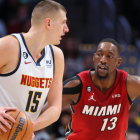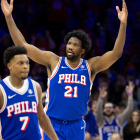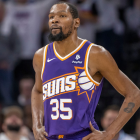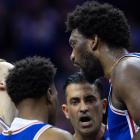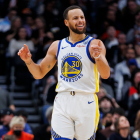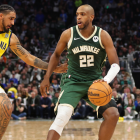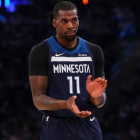
The Miami Heat, who won the same amount of regular-season games this year (44) as they did five years ago -- Tyler Johnson, James Johnson and Hassan Whiteside were all starters on that team -- and lost a play-in game against the Atlanta Hawks on April 11, have solved every puzzle they've encountered in the last seven weeks. Their reward for knocking off the top two seeds in the Eastern Conference? A matchup with the top seed in the West in the NBA Finals.
The Denver Nuggets, who took their foot off the gas down the stretch but otherwise had an exquisite regular season, pose the kind of problems that leave opponents -- even other championship contenders -- flummoxed. You can prepare for Nikola Jokic and Jamal Murray's two-man game, but on a given possession, it's virtually impossible to know how they'll play off each other. Denver has built an almost entirely unscripted offense in its superstar's image, with the understanding that it's harder to stop the pick-and-roll when you're freaked out by what's happening off the ball.
At their best, the Heat can produce a similar sort of panic. Both of these teams designed their offenses to be able to produce good looks in crunch time under playoff pressure. They both move the ball, space the floor, screen and cut, and if the pretty stuff isn't working, then Jimmy Butler, Jokic and Murray are all capable of either making the defense collapse or hitting tough shots in isolation.
The Nuggets are the favorites because no one has been able to stop them. They put up 124.2 points per 100 possessions with Jokic on the court in the regular season, and, through 15 playoff games, that number has dipped only slightly (123.1). As a point of reference, that's more than two points better than the Golden State Warriors managed with both Stephen Curry and Kevin Durant on the floor in each of the three seasons they spent together.
Denver didn't just survive its conference finals matchup with the Los Angeles Lakers; it won in a sweep, leaving LeBron James and Anthony Davis to discuss in the losing locker room whether it was the best team they'd faced as teammates or merely one of the best. In the second round, the last time the Nuggets lost a game, the Phoenix Suns needed otherworldly performances from Devin Booker and Durant to get two narrow victories at home.
Miami is here because it defeated a Boston Celtics team that was slightly more efficient than the Nuggets in the regular season. Boston has better wings and all sorts of lineups that can simultaneously switch and play 5-out, but its offense doesn't disorient you the way Denver's does. The Nuggets punish you for mistakes you don't even know you've made.
The flip side: They haven't seen a team in these playoffs that scores in all the different ways that Miami does, either. And while Denver's defense has held up well, it doesn't have the same type of defensive versatility or talent that the Heat do. As Miami coach Erik Spoelstra said on Monday, it's much easier to put together a good defense when your best players -- Butler and Bam Adebayo -- are elite defenders.
I picked Denver to win the series because, while the Heat have a big menu of defensive schemes and lineups at their disposal, I'm not sure it'll look that way against this particular foe. Even if Miami finds something that bogs the Nuggets down in Game 1 on Thursday, there's a good chance they'll have a counter that renders it ineffective the rest of the way.
None of this is to say that this will be easy for Denver. And given how the Heat have handled this entire postseason, no one should be shocked if they do find something in the opener. In advance of that, here are five questions about the Finals:
1. Can Miami do the put-someone-else-on-Jokic thing?
As coach Michael Malone or any Nuggets player will tell you, it's not as if they're surprised when opposing centers match up with Aaron Gordon and roam around the paint. For all of the conversation about the Lakers putting Rui Hachimura on Jokic so they could keep their rim protector near the basket, it added up to zero wins. In this situation, Gordon can still be dangerous entering the ball to Jokic and cutting or screening shooters open. On some nights, like Game 4 of the conference finals, he'll just knock down open 3s.
This strategy, however, has sometimes been effective. If Denver's spacing isn't right, it can throw the offense out of rhythm. There is no good way to defend Jokic, but this might be the least bad option, if you have the personnel to pull it off.
Miami might not have the personnel, though. It could put Kevin Love back in the starting lineup, but, the way Caleb Martin is playing, this seems unlikely (and Love would be targeted in the pick-and-roll). Could Martin or Butler hold up as well as Hachimura and James did against Jokic? Also unlikely, and Adebayo isn't the same kind of deterrent Davis is as a help defender. Anyone who guards Jokic is at risk of getting in foul trouble, Adebayo included.
I expect Adebayo to start on Jokic, but I'm still curious about how the Heat approach the matchups. If Martin or Butler is on Murray, would they switch Murray-Jokic pick-and-rolls? If they are do, can they front Jokic or double him without getting burned? I'm skeptical.
Miami might be able to turn Gordon into an offensive liability without messing around with the Jokic matchup. Don't be surprised if Butler, an absolute menace off the ball, is the one matched up with Gordon, roaming around and trying to disrupt Denver's flow.
2. How will the Nuggets handle Butler?
Gordon has been the primary defender against Karl-Anthony Towns, Durant and James in the playoffs, and he's easily the Nugget most equipped to guard Butler one-on-one. He has the size, strength and foot speed to make Butler work for his points, provided that he stays down on pump fakes.
When Butler goes matchup-hunting, though, what will Denver do? At the beginning of the Lakers series, the Nuggets were a little too willing to give up the switch when James went at Murray, and I wonder if they'll do things differently with Butler.
Assuming Denver matches up conventionally, expect to see a steady diet of Butler-Adebayo pick-and-rolls. Can Jokic get away with dropping, or will he be up at the level of the screen? Don't be surprised if, at some point, the Nuggets try Gordon on Adebayo so they can switch it. (If this happens, I want to see who they trust to start possessions against Butler. Kentavious Caldwell-Pope and Bruce Brown can pester him, but Jeff Green's size could be useful for the switch.)
Another thing to watch is how the Heat use Butler off the ball. Every time he sets a screen for Duncan Robinson, Max Strus or Gabe Vincent, it could compromise Denver's defense. I could see Spoelstra having those guys screen for Butler, too, with the ball in Adebayo's hands, like the very end of the Bucks series.
3. Will the Heat's zone be a factor?
Miami plays more zone defense than anybody, but this might not be the series to use it heavily. The moment that Jokic catches the ball in the middle of the zone, the Heat will be in a world of trouble.
If it's effective after timeouts and in the non-Jokic minutes, then the zone can still be a factor. Playoff games have swung on much less. But if it's only effective in those situations, then how many minutes can Robinson play? One of the benefits of the zone is that it makes it easier for him to hold up defensively. And if he can't stay on the floor long enough to get his two-man game with Adebayo going, then Miami's offense will suffer for it.
4. Can Denver handle Miami's movement and spacing?
In theory, the Nuggets are exploitable on defense. They were average on that end during the regular season, and they don't have a dominant rim protector or an army of big, interchangeable wings. If you were skeptical of their chances to win the title, it might be because you thought that, at some point during the playoffs, some team would spread them out and light them up.
That hasn't happened consistently yet, but we saw what it looked like when the Suns' stars were hitting pull-ups and their role players were making catch-and-shoot 3s. If Miami puts pressure on the rim and stays hot from outside, Denver could find itself in a tough spot.
It's not just about Butler using Adebayo's ball screens and getting downhill. Kyle Lowry has made 40.6% of his pull-up 3s in the playoffs, but his aggressiveness in taking them has varied game to game. Gabe Vincent won't hesitate to shoot off the dribble, and Robinson hardly needs any airspace to fire away -- off the bounce, on the move, whatever.
In Game 1, watch how the Nuggets defend Miami's shooters coming off screens and dribble-handoffs. If they put two on the ball, this is the simplest way for the Heat to pick Denver apart.
Later in the series, maybe Miami can get Tyler Herro going. He's a legitimate pull-up threat (i.e. he shot 36.9% on pull-up 3s on good volume), and his pick-and-roll chemistry with Adebayo was the best it has ever been this season. (A connected question: Can Herro survive defensively? This doesn't just mean switching or showing and recovering when Murray targets him, it means fighting through screens if he's guarding Caldwell-Pope off the ball.)
5. Can the Nuggets keep this playing fast and under control?
Denver had the fourth-best transition offense in the NBA this season, according to Cleaning The Glass, and the team is coming off a series in which 16.7% of its offensive possessions were in transition, which is about a percentage point above its regular-season frequency. If that happens again, the Heat are toast.
The Nuggets will look to push the ball at every opportunity. Miami needs to sprint back after misses, and it needs to avoid the live-ball turnovers that allowed Boston even a series that began with three straight Heat wins.
It's not all about the fast break, though. What makes Denver special is its tempo in the halfcourt. When the Nuggets look unstoppable, it's because they seem to be a step ahead of the defense at every turn, making quick decision after quick decision until they get a wide-open look behind the arc or at the rim.
Miami's job is to make Denver stop and think. It typically does that well, through ball pressure, switching, gap help and toggling from scheme to scheme. During the regular season, only two teams forced turnovers more frequently than the Heat. The Nuggets have taken care of the ball better than anybody in the playoffs, but that's about to get more difficult.













